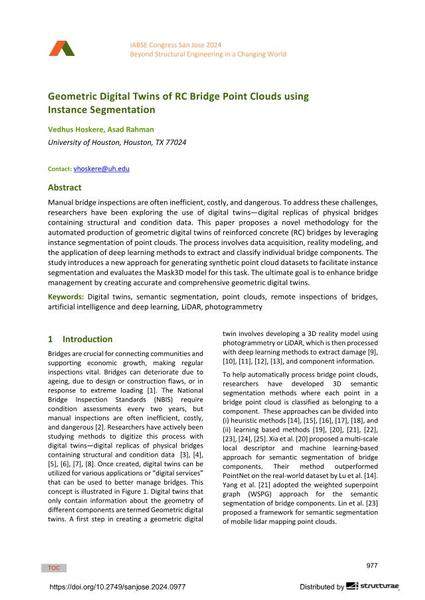Geometric Digital Twins of RC Bridge Point Clouds using Instance Segmentation

|
|
|||||||||||
Détails bibliographiques
| Auteur(s): |
Vedhus Hoskere
(University of Houston, Houston, TX 77024)
Asad Rahman (University of Houston, Houston, TX 77024) |
||||
|---|---|---|---|---|---|
| Médium: | papier de conférence | ||||
| Langue(s): | anglais | ||||
| Conférence: | IABSE Congress: Beyond Structural Engineering in a Changing World, San José, Cost Rica, 25-27 Seotember 2024 | ||||
| Publié dans: | IABSE Congress San José 2024 | ||||
|
|||||
| Page(s): | 977-986 | ||||
| Nombre total de pages (du PDF): | 10 | ||||
| DOI: | 10.2749/sanjose.2024.0977 | ||||
| Abstrait: |
Manual bridge inspections are often inefficient, costly, and dangerous. To address these challenges, researchers have been exploring the use of digital twins—digital replicas of physical bridges containing structural and condition data. This paper proposes a novel methodology for the automated production of geometric digital twins of reinforced concrete (RC) bridges by leveraging instance segmentation of point clouds. The process involves data acquisition, reality modeling, and the application of deep learning methods to extract and classify individual bridge components. The study introduces a new approach for generating synthetic point cloud datasets to facilitate instance segmentation and evaluates the Mask3D model for this task. The ultimate goal is to enhance bridge management by creating accurate and comprehensive geometric digital twins. |
||||

